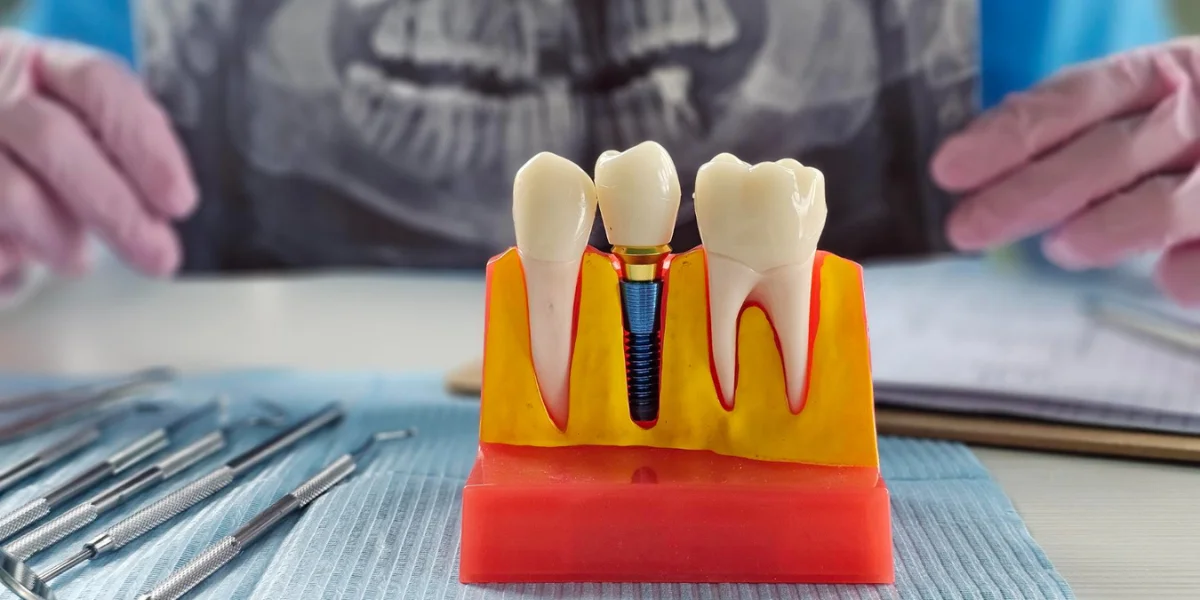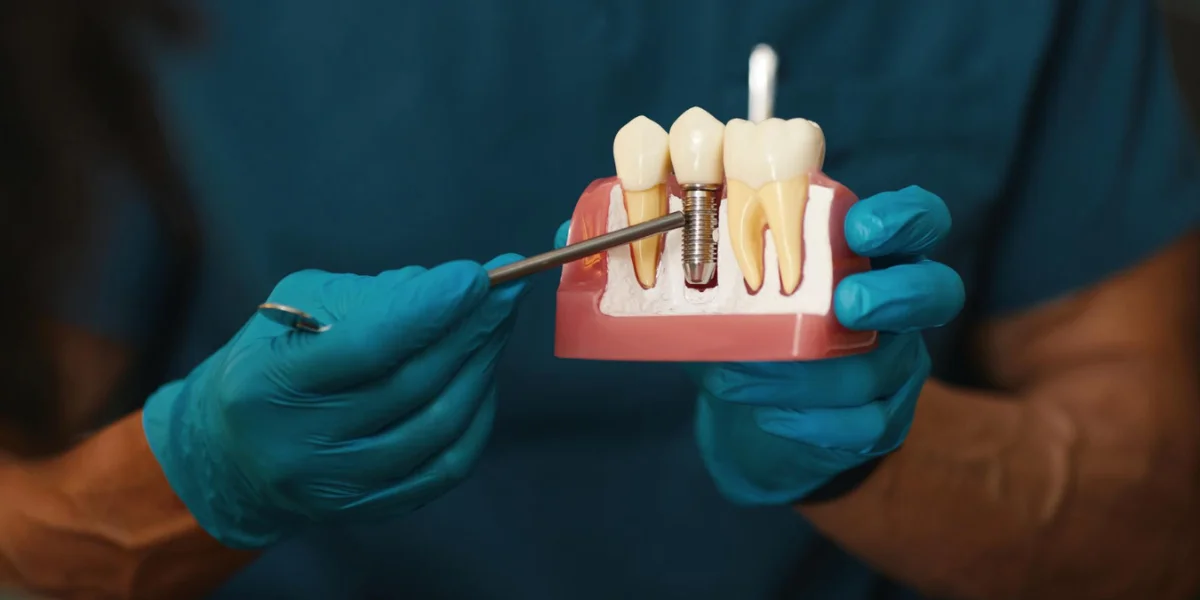A missing tooth or teeth can have a significant impact on a person's confidence and self-esteem. Besides the cosmetic concerns, missing teeth can also cause difficulty in speaking and eating. For many years, denture Treatment was the only solution for people with missing teeth. However, they have revolutionized the way missing teeth are now treated. …
A missing tooth or teeth can have a significant impact on a person’s confidence and self-esteem. Besides the cosmetic concerns, missing teeth can also cause difficulty in speaking and eating. For many years, denture Treatment was the only solution for people with missing teeth. However, they have revolutionized the way missing teeth are now treated. Dental implants treatment is a popular and effective solution that can help restore your smile and give you a boost of confidence. They are designed to look, feel, and function like natural teeth. In this post, we’ll explore the benefits of implants, including improved speech and digestion, enhanced aesthetic appeal, and increased durability. So, if you’re considering dental implants or just want to learn more about this amazing innovation, keep reading to discover everything you need to know.
Introduction to dental implants
Dental implants are artificial tooth roots that are placed into the jawbone to support a replacement tooth or bridge. They are a popular and effective solution for people who have lost teeth due to injury, decay, or other reasons. It looks, feels, and functions like natural teeth and can improve a person’s quality of life in many ways.
Traditional tooth replacement options, such as denture treatment or bridges, can have several drawbacks. Dentures can slip and move around, causing discomfort and embarrassment. Bridges can require the removal of healthy tooth structure from neighboring teeth. Dental implants, on the other hand, are a long-lasting and low-maintenance solution that preserves the integrity of neighboring teeth and gums.
The process of getting dental implants typically involves a series of appointments with a dental specialist, such as an oral surgeon, prosthodontist or periodontist. During the first appointment, the specialist will examine the patient’s mouth and jawbone to determine if they are a good candidate. This may involve taking X-rays or other images to assess bone density and structure.
If the patient is deemed a good candidate, the specialist will then surgically place the implant into the jawbone. Over time, the bone will fuse with the implant, creating a strong and secure foundation for the replacement tooth or teeth. Once it has fully healed and integrated with the bone, the specialist will attach a custom-made crown, bridge, or denture to the implant.
Overall, dental implants are a safe, durable, and effective solution for people with missing teeth. They can improve a person’s oral health, appearance, and self-confidence. If you are considering dental implants, it is important to consult with a qualified dental specialist to determine if they are right for you.
1. What are dental implants?
They are a popular and effective way to replace missing or damaged teeth. They are artificial tooth roots that are placed in the jawbone to hold a replacement tooth or bridge. Implants are made of titanium which is compatible with the human body, and they fuse with the bone over time to create a stable foundation for the replacement tooth.
The process of getting dental implants typically involves several stages. First, it is placed in the jawbone and allowed to heal for several months to allow for osseointegration, which is the process of fusing with the bone. Once the implant is securely anchored in the jaw, a small connector called an abutment is attached, which connects the implant to the replacement tooth or bridge. Finally, the replacement tooth or bridge is attached to the abutment.
It has several advantages over other tooth replacement options. They are durable and long-lasting, and with proper care, they can last for many years or even a lifetime. They are also more comfortable than other options such as dentures, as they are fixed in place and do not move around in the mouth.
2. Benefits of Implants over other options
Dental implants for teeth have become an increasingly popular option for replacing missing teeth, and for good reason. Unlike other options, such as dentures or bridges, dental implants offer a permanent solution that looks and feels like natural teeth.
One of the biggest benefit is their durability. With proper care, it can last a lifetime, whereas dentures and bridges typically need to be replaced every few years. Additionally, dental implants are designed to fuse with your jawbone, providing a stable and secure foundation for your replacement teeth. This not only makes them more comfortable to wear, but also allows you to eat and speak with confidence.
Another major advantage is that they help to preserve the health of your surrounding teeth and gums. With bridges, adjacent teeth need to be ground down to support the replacement tooth, which can weaken them over time. Dentures can also cause irritation and inflammation of the gums. Dental implants, on the other hand, do not require any modifications to your existing teeth, and they actually stimulate the jawbone to prevent bone loss and gum recession.
Finally, dental implants offer a natural-looking and aesthetically pleasing solution for missing teeth. They are custom-made to match the color and shape of your existing teeth, so they blend in seamlessly with your smile. This can help to boost your confidence and improve your overall quality of life.
Overall, implants offer a range of benefits that make them a superior option for replacing missing teeth. If you are considering them, it is important to discuss your options with a qualified dental professional to determine if they are the right choice for you.
3. Who is a good candidate?
- Dental implants are a great option for most people, but not everyone is a good candidate for this procedure. Generally, if you have one or more missing teeth and you are in good overall health, you are a good candidate.
- It is important to have healthy gums and enough bone in your jaw to support the implant. If you have experienced bone loss, your dentist may recommend a bone grafting procedure to build up the bone in your jaw before implant surgery.
- Other factors that may impact your candidacy, include any medical conditions that may affect healing, such as diabetes or autoimmune disorders,
- Your dentist or oral surgeon can evaluate your individual situation to determine whether implants are a good option for you. With proper care, they can last a lifetime and provide a natural-looking, functional replacement for missing teeth.
4. Procedure: What To Expect During Treatment
The dental implant procedure is a multi-step process that requires a high level of expertise from a dental professional. The first step in the process is the initial consultation with your dentist. During this consultation, your dentist will assess the health of your teeth and gums, take X-rays and scans of your mouth, and discuss your medical history.
Once you are deemed a good candidate, the next step in the process is the placement of the implant. This involves surgically embedding a small titanium post into the jawbone to create a strong and durable foundation for the replacement tooth or teeth. After the implant is placed, a healing period of several months is required to allow the implant to fuse with the jawbone in a process called osseointegration.
Once the implant has healed and fused with the jawbone, the abutment is attached to the implant, and an impression is taken of the teeth to create a custom crown or bridge. The final step in the process is the attachment of the custom-made replacement tooth or teeth to the abutment.
Overall, the dental implant procedure takes several months to complete, but the end result is a natural-looking and functional tooth replacement that can last a lifetime with proper care. While the procedure may seem intimidating at first, it is a routine and safe procedure that has helped countless people restore their smiles and improve their quality of life.
5. Aftercare and maintenance
Taking good care of your dental implants is crucial for long-term success. Proper aftercare and maintenance can ensure that your implants last for many years to come. Just like natural teeth, implants require regular brushing and flossing. Make sure you brush twice a day and floss once a day to remove plaque and food debris from around the implant.
It’s also important to visit your dentist regularly for checkups and cleanings. Your dentist will monitor your implants and make sure they are functioning properly. They will also check for any signs of infection or other issues that may need to be addressed. If you notice any changes in your implant or surrounding gum tissue, such as swelling, bleeding, or pain, make sure to contact your dentist right away.
Overall, taking good care of your dental implants is a simple but crucial step in maintaining a healthy and beautiful smile. With proper aftercare and maintenance, you can enjoy the benefits of dental implants for many years to come.
6. The long-term benefits of dental implants
Best Dental implants in Mumbai are a long-term investment in your oral health, and they offer a range of benefits that make them a popular choice for many patients. One of the most significant long-term benefits of dental implants is their durability. Unlike dentures or bridges, which may need to be replaced every few years, dental implants are designed to last a lifetime with proper care and maintenance.
In addition to their longevity, dental implants can also help to preserve the structure of your jawbone. When a tooth is missing, the jawbone can begin to deteriorate or weaken over time. This can lead to a range of problems including a sunken facial appearance, difficulty chewing, and even speech problems. Dental implants are the only tooth replacement option that can stimulate the jawbone and prevent this bone loss from occurring.
Another long-term benefit of dental implants is their ability to improve your overall oral health. When a tooth is missing, nearby teeth can shift or move out of place, which can impact your bite and make it more difficult to clean your teeth properly. This can lead to a range of dental problems including gum disease and tooth decay. Dental implants help to prevent these issues by filling in the gap left by a missing tooth and creating a stable foundation for your remaining teeth.
Overall, dental implants are a long-term solution to missing teeth that offer a range of benefits for your oral health and overall wellbeing. If you are considering dental implants, schedule a consultation with your dentist to discuss the best options for your needs and learn more about the long-term benefits of this popular tooth replacement option.
7. How implants can improve your oral health
Dental implants are a great way to improve your oral health. When a tooth is missing, it can cause the surrounding teeth to shift and move, which can cause difficulty in biting and chewing food properly. This can lead to further dental problems such as tooth decay, gum disease and even bone loss.
Dental implants are designed to replace missing teeth and can improve your oral health in a number of ways. Firstly, they are a permanent solution that can help maintain the structure of your jawbone and prevent bone loss. This is because the implant is placed in the jawbone, where it fuses with the bone over time, creating a stable and durable base for the replacement tooth.
Secondly, dental implants can help to maintain the alignment of your remaining teeth by preventing them from shifting and moving into the gap left by the missing tooth. This helps to reduce the risk of further dental problems and can improve your overall oral health.
Finally, dental implants are easy to care for and maintain, just like your natural teeth. They can be brushed and flossed just like your other teeth, and regular check-ups with your dentist can help to ensure they remain in good condition.
Overall, dental implants are a great way to improve your oral health and restore your smile. If you are missing a tooth or teeth, speak to your dentist today to find out if dental implants are right for you.
8. What are The aesthetic advantages?
Dental implants not only provide functional benefits such as improved speech, better chewing ability, and preservation of jawbone, but they also offer aesthetic advantages that can significantly improve one’s appearance and self-esteem.
Missing teeth can cause a lot of insecurities, making people feel self-conscious about their smile and even leading to social anxiety. Dental implants can help people regain their confidence by filling in the gaps and making their smile look natural and complete.
One of the biggest advantages of dental implants is that they are designed to look and feel like natural teeth, which means that they blend seamlessly with the rest of your smile. Unlike dentures, which can slip and shift, making people feel uncomfortable in social settings, dental implants stay firmly in place, allowing people to speak and eat with confidence.
Another aesthetic benefit of dental implants is that they support the facial structure, preventing the sunken-in appearance that can happen as a result of missing teeth. This can help people look younger and more vibrant.
Overall, dental implants can provide a range of aesthetic benefits, from improving the appearance of your smile to boosting your self-esteem and confidence. If you are considering dental implants, it’s important to consult with your dentist to determine if they are right for you and to discuss your options for achieving the best possible outcome.
9. Financial considerations
When considering dental implants, it’s important to understand the financial implications. While the upfront cost of dental implants may be higher than other options, such as dentures or bridges, they often provide greater long-term value.
Dental implants are a permanent solution that can last a lifetime with proper care, unlike other options that may need to be replaced every few years. This means that the initial investment in dental implants may ultimately save money in the long run.
Overall, while the cost of dental implants may seem daunting at first, it’s important to consider the long-term benefits and potential cost savings when making a decision about tooth replacement options.
Conclusion
We know that having missing teeth can be embarrassing and uncomfortable, but it can provide a permanent solution that looks and feels natural. With the information provided in this article, we hope that you feel more informed and understand how you can improve your overall oral health and quality of life. If you have any questions or concerns about dental implants, don’t hesitate to speak with us. Here’s to a winning smile!




